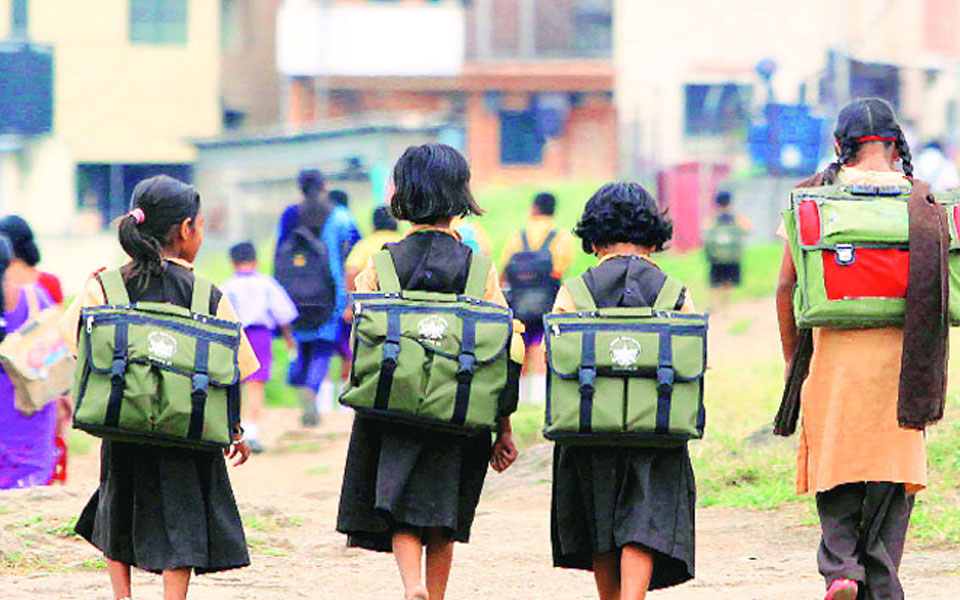Government schools are in news again. The only time when government schools feature in news is when they are due to be closed. Reports in the media say more than 3000 schools have been closed and more would down the shutters soon. Primary and Higher primary education minister N Mahesh has said they’d ensure the government schools are not closed for whatever reasons. Governments in the past gave similar assurances but then they could hardly stick to their promise.
Governments assure that the schools won’t be closed. But the unsaid meaning in this is ‘if they close, remember we weren’t responsible’. If the attendance of children consistently drops in a government school, they’d obviously be rendered useless and shut down sooner or later. Our politicians know this well. None of the schools in our state closed by themselves. There is an organized conspiracy behind this. If you starve a person to death, doesn’t that amount to murder? Similar is the situation with schools.
The basic infrastructure of the school is consistently destroyed, and no new measures are initiated to ensure they begin to work well. When they do not respond to the needs of modern times, schools will obviously go into the oblivion. And this act is carried out by the governments. All parents send their kids to school with the hope that they’d be well prepared to earn a livelihood for themselves in the future and be ready to face challenges too.
Hence, they choose the schools with much care. If they feel government schools are not meeting the needs of their children’s future, they’d obviously take their children to other schools.
There must be some significant reason behind making private schools inevitable for parents, by way of weakening the government schools despite supply of books, mid day meals, free uniform and books etc.
Government is probably playing a role in this closure too. While some schools are being shut down, some of them are being adopted by wealthy corporates who have set their eyes on the most valuable land on which the schools stand. But then, some organisations, social servants and volunteers are really doing a good job of running defunct government schools better than the government itself.
At the same time, some vested interests are planning to materialize their plans on this occasion when the schools are being rendered useless. This ‘adoption scheme’ is being used really well by some organisations. Today, some schools are much like children who are not wanted by either of the parents. And in private space, parents are struggling to meet the expenses of kids getting into nursery and primary, forget even higher classes. If the schools shut down, children coming under BPL category will have a tough time accessing education. Even the middle class will have to fall prey to costly education. Kannada, the language, will hardly have any chances of survival. In the future, there’d be clear demarcation between the ones that can afford education and the ones that cannot. This would increase the difference between the haves and have nots.
Even if the government worries one little bit about the people in bottom most rung of the society, it should not allow closure of government schools ever.
Let the Truth be known. If you read VB and like VB, please be a VB Supporter and Help us deliver the Truth to one and all.
Kalaburagi: Four men have been arrested in Kalaburagi on charge of hacking a man with lethal weapons and pelting stones at him under the limits of Station Bazaar Police Station recently.
According to police sources, Anand Jalak Shinde (34), Ashitosh Jalak Shinde (30), Imran Mehboob Sheikh (28) and Sohaib Anwar Qureshi have been arrested. The men are accused of the brutal murder of Syed Mehboob, a resident of Station Bazaar Upper Line Hamalawadi in the city.
An FIR was filed by the Station Bazaar Police Station based on a complaint given by Syed Ismail, father of the deceased Syed Mehboob.
Following quick probe, the police team successfully arrested the suspects within 24 hours. The arrested men were produced in court and have been sent to judicial custody.
The City Police Commissionerate has appreciated in an official release the police team’s quick solving of the murder case and arrest of the four men accused of murdering Syed Mehboob.





